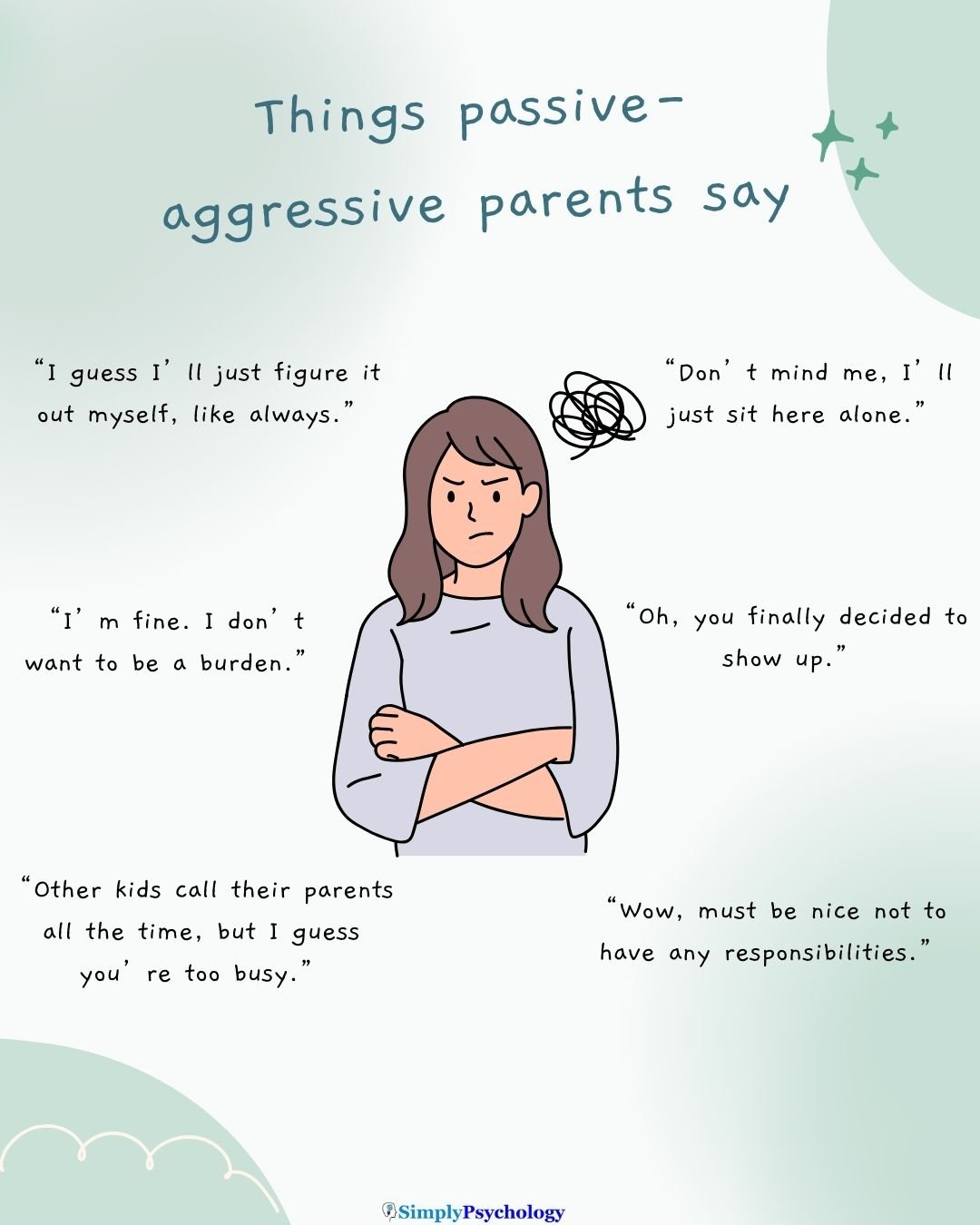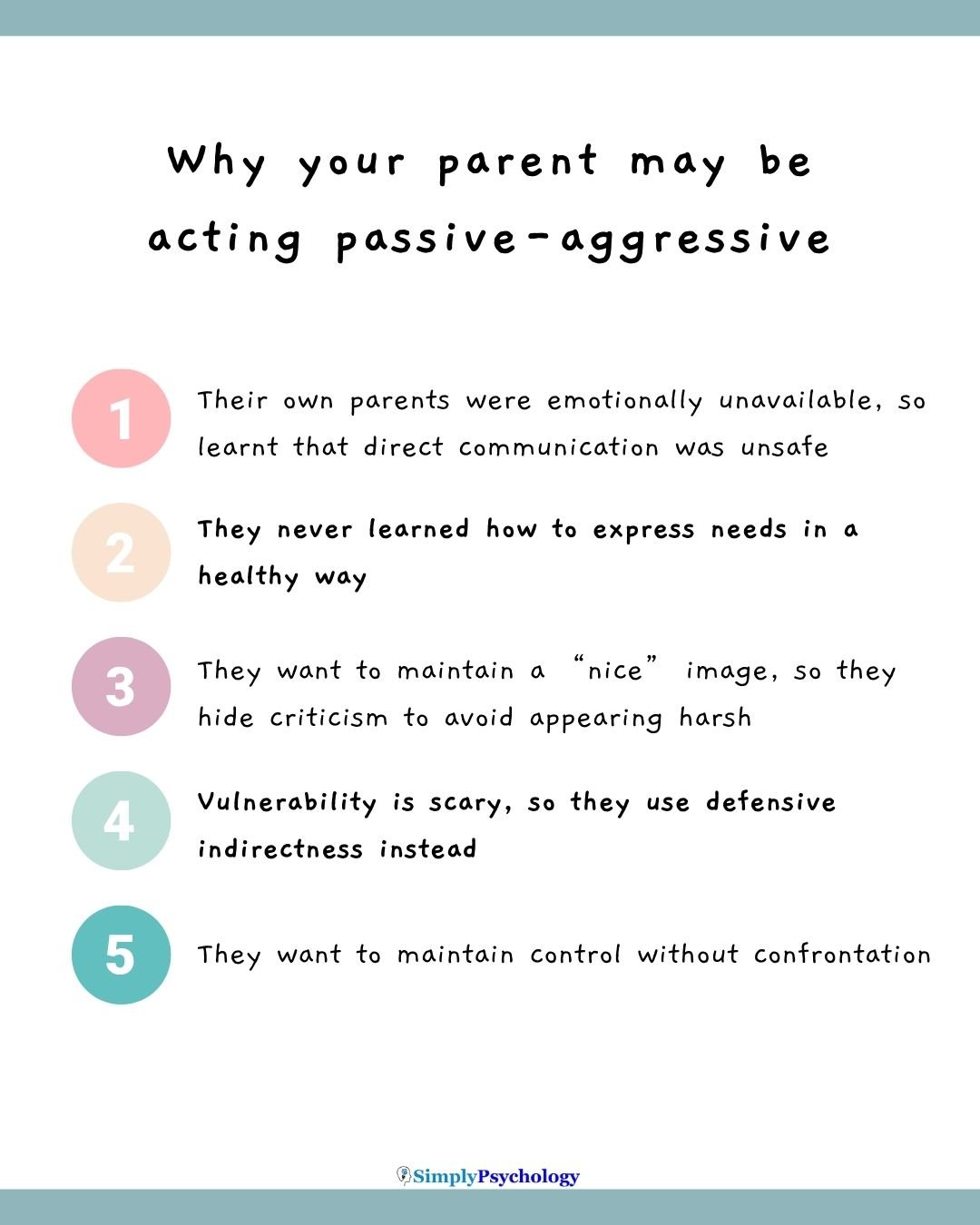Passive-aggressive parents are caregivers who express anger, resentment, or disapproval indirectly rather than communicating openly. Instead of telling you what’s wrong, they might use subtle digs, sarcasm, or silence to convey their displeasure.
Their words and tone often don’t match. They may say everything is fine while behaving in ways that clearly signal otherwise.
Imagine you forget to call your mother on her birthday. Instead of telling you she’s hurt, she might say, “Oh, I guess you’ve been busy with more important things.” This statement isn’t a direct complaint, but the underlying message is unmistakable — and guilt-inducing.

Psychologically, this is known as indirect expression of negative emotions, and it’s a hallmark of passive aggression.
In a parent-child relationship, this can be deeply destabilizing because it makes emotional rules unclear.
Signs and Traits of Passive Aggressive Parenting
Identifying passive aggression is challenging because it’s often wrapped in politeness or humor. Still, the signs become clearer once you know what to look for:
- Silent Treatment – Withdrawing communication instead of expressing feelings.
- Sarcasm Disguised as Humor – “Oh, look who finally cleaned up. Did a miracle happen?”
- Backhanded Compliments – “You look great… for someone who doesn’t usually dress up.”
- Intentional Procrastination – Delaying tasks they agreed to, as a way to express resentment.
- Selective Memory – “I forgot you told me about your performance… was it really that important?”
Over time, these patterns erode trust and leave children feeling like they must constantly decode hidden meanings.

Why Parents Use Passive Aggression
While passive-aggressive behavior may feel manipulative or hurtful, it often comes from learned patterns and emotional limitations rather than conscious malice.
Understanding why parents act this way doesn’t excuse the behavior, but it can help you navigate it with more clarity and less self-blame.
1. They Grew Up with Emotionally Unavailable Caregivers
Many passive-aggressive parents had upbringings where emotions weren’t openly discussed — or worse, were punished. In such homes, expressing frustration, sadness, or disappointment might have led to ridicule or rejection.
Over time, these children learned that direct communication was unsafe. Instead, they developed subtle, indirect ways to signal displeasure.
Example:
If a father grew up with a parent who responded to anger with, “Stop whining or I’ll give you something to cry about,” he may have learned to hide his true feelings.
As an adult, he might withhold affection or make sly remarks when upset, rather than risk open conflict.
This is often tied to emotional neglect, where the child’s needs weren’t validated. The result? A deep discomfort with vulnerability, replaced by defensive indirectness.
2. They Lack Communication Skills to Express Needs Openly
Passive aggression often flourishes when someone has never been taught healthy communication techniques.
These parents might genuinely not know how to say, “I’m hurt you didn’t visit” without it sounding like a guilt trip.
Instead, they resort to hints, sarcasm, or silent treatment, hoping you’ll “read between the lines.”
Example: A mother might feel left out when her adult children take a vacation without her. Instead of saying, “I wish I could have joined you,” she might say, “Must be nice to have that much free time,” masking her hurt as a casual observation.
Recognizing that this is a skill gap — not always an intentional attack — can help you depersonalize their comments and respond more effectively.
3. They Want to Avoid Appearing Harsh While Still Expressing Disapproval
Some parents value appearing “nice” or “easygoing” to maintain a certain self-image.
They may believe that direct criticism will make them look harsh, controlling, or unloving — so they sugarcoat it with sarcasm or backhanded compliments. This lets them voice disapproval without taking ownership of their criticism.
Example:
Instead of saying, “I don’t like your career choice,” a father might remark, “Well, as long as it makes you happy… I guess,” leaving the negative message implied rather than stated.
This is often rooted in fear of conflict, combined with image management — they want to control the emotional tone while still influencing your choices.

Bottom Line
Passive aggression in parents often comes from a mix of learned emotional avoidance, poor communication skills, and a desire to maintain control without open confrontation.
Understanding these motives helps you see the pattern, which is the first step in deciding how to respond.
The Emotional Impact on Children
Growing up with passive-aggressive parents is like living in a home where the emotional weather changes without warning.
There are no clear rules about what will cause tension, so children learn to constantly scan for danger — even in silence.
While the effects may not surface immediately, the psychological imprint is lasting. It shapes how children see themselves, their relationships, and the world.
1. Low Self-Esteem
Passive-aggressive parenting sends mixed messages:
- Words may be affectionate, but actions are cold.
- Jokes are framed as “teasing,” but they cut deep.
- Approval is given… but often with a catch.
Over time, this erodes confidence. The child learns:
“If I can’t even tell when I’m making someone happy or upset, how can I trust myself?”
Example:
If a child proudly shows their parent a school project and hears, “Oh, that’s… interesting,” instead of encouragement, the enthusiasm drains instantly. Even without overt criticism, the underlying disapproval is felt.
Low self-esteem from these mixed messages often leads to overachieving or people-pleasing in adulthood, as the individual desperately seeks clear approval
2. Chronic Anxiety
When children never know where they stand, they live in a constant state of emotional hyper-vigilance. They watch tone of voice, body language, and even the way a door is shut to predict mood changes.
This heightened alert system may serve them in childhood — helping them avoid conflict — but in adulthood, it becomes debilitating anxiety.
Signs in Adult Life:
- Overthinking every text or email.
- Apologizing excessively.
- Feeling tense in relationships even without a clear reason.
Example:
Jason found himself feeling panicked whenever his partner used sarcasm. Through therapy, he realized these feelings were tied to his mother’s constant “jokes” about his failures — a form of passive aggressive criticism that left him on edge.
3. Relationship Struggles
Children of passive-aggressive parents often replicate the patterns they learned — either by becoming passive-aggressive themselves or by tolerating it in others.
Common Relationship Issues:
- Difficulty expressing needs directly.
- Avoiding conflict at all costs.
- Misinterpreting harmless comments as criticism.
- Attracting partners who communicate indirectly.
Example:
An adult child might respond to a partner’s hurtful comment not with “That upset me,” but with days of quiet withdrawal — mimicking the silent treatment they grew up with.
This cycle can be broken, but only through conscious practice of direct communication and boundaries.
How to Recognize Passive Aggression Early
- Pay attention to inconsistencies between words and actions.
- Watch for emotional whiplash — warmth one moment, coldness the next.
- Look for patterned sarcasm or “forgetfulness” around important matters.
Healthy Strategies to Cope with Passive Aggressive Parents
Passive-aggressive parents thrive in unclear emotional territory — they rely on indirect communication, guilt, and subtle digs.
Your job is to create clarity, boundaries, and emotional stability in your own life, even if they never change.
1. Setting Emotional Boundaries Like a Pro
Boundaries aren’t about controlling the other person — they’re about protecting your own mental health.
A boundary says: “Here’s where I end, and you begin.”
Dr. Henry Cloud, author of Boundaries, explains that people who use passive aggression often “test” limits, hoping you’ll give in to avoid tension. Clear boundaries disrupt this cycle.
Practical Application:
- Decide your non-negotiables (e.g., no sarcastic remarks about your life choices).
- State your boundary calmly, without over-explaining.
- Follow through every time — consistency is key.
Sample Script:
“I value our relationship, but I’m not okay with sarcastic remarks about my job. If it happens, I’ll step away from the conversation and we can talk later.”
Case Study:
Laura, 26, told her mother she would hang up the phone if conversations turned into guilt-tripping. It happened twice — Laura hung up both times. Over weeks, her mom reduced the guilt tactics because she realized Laura meant it.
2. Communicating with Assertiveness
Assertiveness is expressing your needs clearly and respectfully without aggression.
Passive-aggressive people often count on your discomfort with confrontation. Assertiveness disrupts this because it’s calm, confident, and direct — without being hostile.
The 3-Step Assertiveness Formula:
- Describe the behavior factually.
- Express your feeling about it.
- State your request moving forward.
Example:
“When you don’t respond to my messages for days (behavior), I feel ignored and unimportant (feeling). I’d appreciate it if you could let me know when you’re busy so I understand (request).”
Keep your tone neutral and steady. The less emotional heat you bring, the less they can twist your words.
3. Seeking Outside Support
Even the most skilled communicators can burn out if they face constant passive aggression. External support provides perspective and encouragement.
Options for Support:
- Therapists – Help you untangle guilt, anxiety, and self-esteem issues.
- Support Groups – Connect with people who’ve lived through similar dynamics.
- Mentors/Friends – Offer reality checks when you’re doubting yourself.
Case Study:
Robert, 33, joined a support group for adult children of emotionally immature parents. Hearing others share similar stories reduced his guilt and helped him feel less alone.
Humans regulate emotions through connection. Support systems help you counteract the isolation that passive-aggressive parents often create.
4. Practicing Emotional Detachment
Emotional detachment isn’t coldness — it’s refusing to take emotional bait.
Passive-aggressive parents often rely on emotional hooks. If you get upset, they can either play the victim or shift the blame. When you stay calm and neutral, you remove the reward for their behavior.
How to Practice Detachment:
- Pause before responding — even 5 seconds helps.
- Stick to the facts, not the feelings they’re trying to provoke.
- Use short, non-committal responses when they bait you.
Sample Script:
“I hear you.”
“That’s your perspective.”
“I’ll think about it.”
Case Study:
Sonia, 29, noticed that when she responded with short, neutral phrases instead of defending herself, her father’s sarcastic comments became less frequent — he wasn’t getting the reaction he wanted.
Advanced Coping Techniques for High-Conflict Situations
Sometimes, basic strategies aren’t enough. If your parents’ passive aggression escalates into intense guilt trips, emotional blackmail, or constant criticism, these advanced tools can help.
1. The “Gray Rock” Method
Purpose: Make interactions so neutral that they lose interest in provoking you.
- How: Keep responses bland, avoid personal details, and don’t display visible emotion.
- Example: If they say, “I guess you’re too busy for your family now,” you simply respond, “I’ve had a lot on my plate lately,” and change the subject.
2. Broken Record Technique
- Purpose: Maintain your boundary without getting pulled into circular arguments.
- How: Repeat your statement calmly, no matter how they try to sidetrack.
- Example: “I’m not discussing this right now.” (Repeat as needed.)
3. Reframing Their Words
- Purpose: Defuse sarcasm or guilt trips by reframing them in a neutral, non-combative way.
- Example: Parent: “Must be nice to have so much free time to go out.” You: “Yes, I enjoyed the evening. It was a good way to recharge.”
Breaking the Cycle: Avoid Becoming Passive Aggressive Yourself
Awareness is the first safeguard.
You might find that when you’re upset, your instinct is to hint instead of saying things outright — exactly what you learned from your parents.
- Notice when you’re tempted to “drop hints.”
- Pause and ask: “What do I actually need to say?”
- Deliver the message directly, respectfully, and without hidden jabs.
Example: Instead of saying to your partner, “I guess you didn’t notice the dishes,” try: “Could you please wash the dishes tonight?”
When to Seek Professional Help
Passive aggression can cross the line into emotional abuse when it’s constant, manipulative, and aimed at controlling your decisions.
Red Flags That You Need Help:
- Feeling constant dread before seeing your parent.
- Losing sleep over their potential reactions.
- Isolating yourself from others to avoid conflict.
Finding the Right Therapist:
- Look for those specializing in family systems therapy or toxic relationship recovery.
- Websites like counselling directories can help you filter by specialty.

